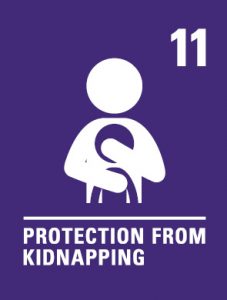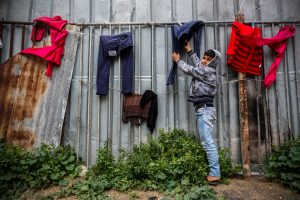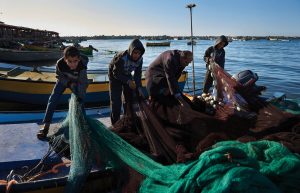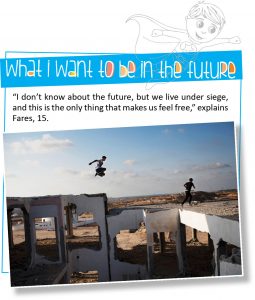 In the words of United Nations High Commissioner for Human Rights Ms. Michelle Bachelet, “Every child has a right to grow up safe, to benefit from essential services, and to express her or his opinions, desires and needs. Children are human beings with fundamental rights, and their views must be heard and taken into account at all levels of society.”
In the words of United Nations High Commissioner for Human Rights Ms. Michelle Bachelet, “Every child has a right to grow up safe, to benefit from essential services, and to express her or his opinions, desires and needs. Children are human beings with fundamental rights, and their views must be heard and taken into account at all levels of society.”
This year marks the 30th anniversary of the Convention on the Rights of the Child, the most widely ratified human rights treaty in history. It has been a powerful driver for change. At a global level, girls and boys today are in a markedly better situation in terms of health or education and, generally speaking, enjoy greater freedoms than ever before to make their own choices. Now more so than ever, children across the world are acting to claim their human rights and the rights of others, standing up to power and demanding change.
In fact, as one recent striking example, sixteen child petitioners – including Greta Thunberg – from 12 countries around the world presented a landmark official complaint to the United Nations Committee on the Rights of the Child to protest lack of government action on the climate crisis. This was made possible through the third Optional Protocol to the Convention which created the first international complaints procedure giving children the possibility to claim their rights at an international level. It is an important complement to the convention to strengthen the status of children as rights holders, to ensure that children can seek redress if their rights are violated, and to expand their possibility to be heard in an international forum.

In the implementation of the convention, virtually every country has passed laws to protect the rights of children and has set up programs to realize those rights to the benefit of the children involved and equally to that of society at large. Programs in areas such as education, access to justice, nutrition, and health care have had a tremendous positive impact on children across the world. In doing so, states have also contributed to the realization of the Sustainable Development Goals, the SDGs. Indeed, the convention and the SDGs, while separate frameworks, are mutually reinforcing: the realization of child rights supports the achievement of the SDGs and the implementation of the SDGs supports the realization of child rights. As governments operationalize the SDGs at local and national levels, they contribute to realizing the normative principles established through the convention.
However, despite the noticeable advancement of the situation of children over the past decades, our work is far from over. The rights of many children continue to be violated, particularly children growing up in vulnerable situations because of conflict, discrimination, and deprivations.
In the occupied Palestinian territory (oPt), a similar picture of improvement over the years combined with ongoing sizeable challenges presents itself. Major strides have been made during the last decades to improve the situation of children in the oPt, with some social indicators showing near universal immunization coverage and high school enrollment rates – including for girls – in primary education, demonstrating progress well beyond other countries in the region.
But much remains to be done before every Palestinian child is to fully enjoy every fundamental human right. This entails addressing the many obstacles that children face in accessing basic services and fulfilling their rights. According to UNICEF, in the oPt, 2.5 million people (a little over half the population), including more than 1 million children, are in need of humanitarian assistance. Almost one-third of Palestinian families live below the poverty line, and unemployment rates are high (32.4 percent across the oPt and 53.7 percent in Gaza, where youth unemployment reaches 60 percent). Coping mechanisms are eroding fast, with some children and families resorting to negative strategies such as school dropout, child labor, substance abuse, and early marriage. Such obstacles are, to a large extent, developmental in nature and at times linked to cultural and religious issues as, for example, the case with child marriage or the violence children face in their schools and communities.
However, the major factor that impedes the full realization of children’s rights in the oPt comes in the form of the decades-long Israeli occupation, including the Gaza blockade.

Photo ©UNICEF-SoP/2019.
In the oPt, out of a total population of around 4.8 million, about 2.3 million (1.3 million in the West Bank and 1 million in Gaza), or almost half of the population, are children. On the basis of these figures alone, it is clear that children will be disproportionately affected by the conflict. As the United Nations Secretary-General stated in his June 2019 report on children and armed conflict, as of December 2018, 203 Palestinian children were held over security offences by Israeli forces, and for the whole of 2018, 59 Palestinian child casualties were attributed to Israeli forces. Moreover, children have suffered in terms of enjoying their right to health in instances of delays in permit applications to Israeli authorities for accessing medical treatment in Israel, or in terms of their right to education when schools were damaged in the context of military escalations or security operations. The impact of the restrictions on freedom of movement – in the form of checkpoints and the permit regime – only compound the challenges Palestinian children suffer in the enjoyment of their rights.
Perhaps the situation of children in the context of the Great March of Return demonstrations in Gaza is most egregious of all. Since the start of the demonstrations on March 30, 2018, no less than 43 children have lost their lives, and a staggering 4,067 children have been injured. As if these numbers are not baffling enough, we should also not be oblivious to the much wider and protracted impact on the mental health of children and families as a result of the humanitarian situation in Gaza.
It is hard to see how the overall situation of children in the oPt can be reconciled with the core principles of the convention, namely, nondiscrimination, the child’s best interests, the right to life, survival, and development, and the right to be heard. And yet every day Palestinian children display inspiring stories of resilience and hope. Many demonstrate great skills and talents, a determination to continue to learn and to succeed despite the odds, and a drive to come up with innovative solutions to the problems their communities face and help build a brighter, more peaceful future.
Decision-makers and elected officials should follow the example of these children’s inspiring stories. I call upon the duty-bearers in the oPt to heed the call by the Committee on the Rights of the Child, which is the body in charge of monitoring states’ compliance with the provisions of the convention, to renew their commitment to the convention, in celebration of the 30th anniversary of the convention, by pledging to take one specific and measurable action for the promotion, protection, and realization of the rights of the child.



